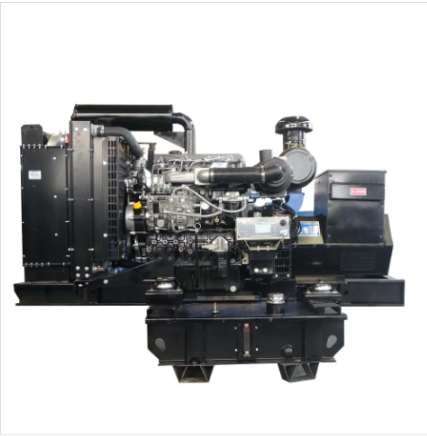Əsas Nöqtələr Dizel Pompa Seçməkdə Dizel su pompu
Fərqli Tətbiqlər üçün Sxət Dərəcə Talabları
Dizel su nasosu seçərkən işin tələb etdiyi məhsuldarlığı müəyyən etməklə başlamalısınız. Məhsuldarlıq adətən dəqiqədə gallon (GPM) və ya litr (LPM) ilə ölçülür və bu rəqəmlər nasosun necə istifadə olunacağına görə ciddi şəkildə dəyişə bilər. Məsələn, kənd təsərrüfatı işləri üçün tələb olunan su miqdarı arxa tərəfdəki bağçalar və ya kiçik ərazilərin təminatı üçün lazım olanlardan çox daha böyükdür. Səbəbi isə bitkilərin ümumiyyətlə daha çox suya ehtiyacı olmasıdır. Ağıllı alıcılar gələcəyi düşünməlidirlər. Hazırda daha ucuz bir şey almaqdan və sonra işlər böyüdükcə və ya dəyişəndə onu əvəz etməkdən əvvəl gələcəkdə böyük tələbləri ödəyə biləcək bir şey almaq daha yaxşıdır. Gələcəyə planlama uzun müddətdə pul qənaət etməyə kömək edəcək.
Baş basinq spesifikasiyalari və performans
Diesel su nasosunun müxtəlif relyeflər və hündürlüklər üzərində suyu nə qədər yaxşı hərəkət etdirəcəyini qiymətləndirərkən baş təzyiqi ilə bağlı yaxşı təsəvvürə sahib olmaq çox vacibdir. Ümumi Dinamik Baş (UDB) adlandırdığımız şey əsasən suyun qalxması üçün tələb olunan şaquli məsafə ilə boru divarlarında yaranan ən istənilməz sürtünmə itkilərinin cəminə bərabərdir. Sistemimiz üçün nə qədər UDB-ə ehtiyacımız olduğunu müəyyən edərkən əslində suyun nə qədər uzağa çatacağını müəyyən edirik, bu, qravitasiyaya qarşı dağın zirvəsinə qədər itələmək və ya uzun torpaq sahələri üzərində uzanmaq deməkdir. Əksər istehlakçılar istehsalçının texniki xüsusiyyətlərini və performans diaqramlarını yanaşı qiymətləndirərək işlərinə uyğun olan UDB tələblərinin həm aşağı, həm də yuxarı həddini ödəyən nasosları seçirlər. Ağıllı montajçılar ən ucuz variantı seçməkdən əvvəl sahə şərtləri ilə ən yaxşı uyğunluğu təmin edən baş təzyiqi göstəricilərinə malik nasosları üstün tuturlar.
Yanacaq effektiyliyi və işleyiş xərcləri
Dizel su nasosu seçərkən yanacaq səmərəliliyi çox əhəmiyyətlidir, çünki bu, avadanlığın hər gün işlədilməsi üçün xərclənən pul miqdarını təsir edir. Müxtəlif nasosların yanacaq sərfi ilə onların təmin etdiyi güc müqayisəsi büdcəyə həssas operatorlar üçün hansının daha yaxşı işlədiyini müəyyən etməyə kömək edir. Daha yaxşı modellər əhəmiyyətli dərəcədə yanacaq sərfiyyatını azalda bilir və bu da gələcəkdə real qənaət deməkdir. Yanacaq qənaəti ilə bağlı sahə testlərindən və ya sənaye hesabatlarından əldə edilmiş faktiki məlumatların nəzərdən keçirilməsi bu halda məqbuldur. Belə məlumatlar tez-tez bizneslərin əslində səmərəli nasoslar seçməklə nə qədər pul qənaət edə biləcəyini göstərir. Ağıllı operatorlar həmişə xərclərin azaldılması və işin düzgün yerinə yetirilməsi üçün yanacaq qənaət edən xüsusiyyətlərə diqqət yetirir, çünki bu, istənilən əməliyyatın bankrot olmadan səliqəli şəkildə aparılmasının zəmini olur.
Çətin Çevrələrdə Dayanıqlılıq
Dizel su nasosu seçərkən əgər onun çətin vəziyyətlərdə də davamlı olmasını istəyiriksə, möhkəmliyinə xüsusi diqqət yetirmək lazımdır. Pas və aşınmaya davamlı materiallardan hazırlanmış nasoslara diqqət edin, xüsusilə dərsə ərazilərində və ya kənd təsərrüfatlarında gündəlik olaraq təbiət və toz tərəfindən təzyiqə məruz qalan avadanlıqlar üçün bu xüsusiyyət vacibdir. İstiliyin ekstremal təsirlərini və ya uzun müddət dayanıqlı işləməni maneə törətmədən necə dəstəklədiyini göstərən sertifikatları yoxlayın. Bəzi şirkətlər həqiqətən də məhsullarını buraxmadan əvvəl real şəraitdə sınayır. Bu cür sınaqlar tez-tez müəyyən bir modelin zamanla sərt şərtlərə necə davam gətirdiyini göstərir. Sağlam konstruksiya və korroziyaya qarşı yaxşı qorunma uzun xidmət müddəti və çətin anlarda baş ağrısından qoruyur. Ən yaxşı nəticəni əldə etmək üçün sahədə özünü sübut etmiş, hər cür çətinliklərlə üzləşə biləcək maşınlar hazırlayan brendləri seçin.
Pompların Növlərinin Xüsusi İstifadə Olları Ilə Üst-Üstə Götürmək
Zirai Sulama Sistemləri
Fermerlər üçün ən yaxşı məhsul yığımını təmin etmək və sahələrdə səmərəli su istifadəsi üçün doğru nasosları seçmək sadəcə ələ uyğun gələni götürmək demək deyil. Fermerlər hər bir nasos növünün həqiqətən nə edə bildiyini bilməlidirlər. Böyük fermerliklər adətən damcı xətləri və ya böyük sahələri suvarmaq üçün istifadə edilən iri sistemlərlə işlədikdə, yüksək məhsuldarlığa malik nasosları seçirlər. Əslində bu müxtəlif suvarma üsulları nasoslardan tamamilə fərqli tələblər irəli sürürlər. Damcı sistemləri ümumiyyətlə daha yavaş axın sürətində işləyir, o zaman ki, sahələri suvarmaq üçün istifadə edilən nasoslar böyük ərazilərə su tədarükü edə bilməlidirlər. Su istifadəsi ilə bağlı qaydalar da bölgədən bölgəyə müxtəliflik göstərir. Bəzi yerlərdə suyun istifadə həcmi və yerli şəraitə uyğun olaraq hansı nasosların istifadəsinə icazə verildiyi ciddi qaydalara əsaslanır. Bütün bu qaydalara riayət etmək qaynaqların düzgün idarə edilməsi və qanuni cəhətdən düzgün davranmaq üçün çox vacibdir. Nəticədə, nasosların texniki xüsusiyyətlərini sahənin real tələblərinə, becərilən məhsula və yerli qaydalara uyğunlaşdırmaq qiymətli su ehtiyatlarını israf etmədən məhsuldarlığı artırmağa kömək edir.
Bina sahələrinin suyunun atılması
Dizel su nasosları inşaat sahələrində əsas avadanlıqlardan biridir və yeraltı suların səviyyəsini idarə etməyə, eyni zamanda sel problemlərini başlamazdan qabaq dayandırmağa kömək edir. Sahənin drenaj işləri ilə məşğul olduqda müqaviləçilər müəyyən sərf və təzyiq tələblərinə uyğun nasosları seçməlidirlər ki, su iş sahəsindən kifayət qədər sürətlə çıxarılsın və sahə quru qalsın. Yaxşı su idarəetməsi müddətli işlərin yerinə yetirilməsində ən böyük fərqi yaradır. Güclü mühərrikli nasoslarla təchiz edilmiş inşaat sahələrinə baxdığımızda belə sahələrin suyu daha tez təmizlədiyini görərik. Bu da işçilərin gözləməkdən əvəz təmir və tikinti işlərinə birbaşa başlamasına imkan verir. Praktiki təcrübə göstərir ki, layihənin planlaşdırıldığından uzun sürdüyü hallarda nasosların texniki xüsusiyyətlərinin düzgün seçilməsi ilə həm vaxt, həm də pul qazanılır. Bu mərhələnin düzgün yerinə yetirilməsi yalnız işçilərin təhlükəsizliyini təmin etmir, həm də bütün proseslərin daha səlis getməsinə kömək edir. Bütün bu səbəblər dizel nasosları ciddi inşaat drenaj işləri üçün əvəzsiz avadanlıqlar kimi qalır.
Acil su taşırma halları
Dələduzlu sel hallarında dizel su nasosları sürətlə yerləşdirilə bilən və böyük miqdarda suyu səmərəli şəkildə idarə edə bilən əsas avadanlıqlara çevrilir. Bu nasoslar fəlakət reaksiya işlərində əhəmiyyətli rol oynayırlar, buna görə də ən çox daşınma qabiliyyəti, yaxşı debiti və sürətli quraşdırma vaxtları vacibdir. Sular yüksələrək binaları və qonşuluqları təhdid edən anlarda bu nasosları mümkün qədər tez işə salmaq hər şeyi dəyişir. Sahə komandaları üçün vacib olan faktorlar bu qurğuların köçürülməsinin nə qədər asan olması, stresli vəziyyətlərdə möhkəm dayanması və müxtəlif mühitlərdə işləməsi ola bilər. Keçmiş sel hadisələrinə baxdıqda dizel nasosların zərəri azaltmaqda nə qədər yaxşı işlədiyini görə bilərik, bu barədə bir çox yerli hakimiyyətlər təcrübə yolu ilə təsdiq veriblər. Suyu sürətlə aradan qaldıran və zəif zonaları qoruyan qabiliyyətlərinə görə dizel nasoslar müasir sel nəzarəti tədbirlərinin əsasını təşkil edirlər və tez-tez kateqorik hadisələri icmaların həll edə biləcəyi vəziyyətlərə çevirirlər.
Uzun müddətlik güvəndiricilik üçün texniki diqqət çəkir faktorlar
Təklif edilən xidmət aralığı
İstehsalçı təlimatlarına əsasən dizel su nasoslarının texniki xidmətini nə vaxt etmək lazım olduğunu bilmək onların daha uzun müddət xidmət etməsi və daha yaxşı işləməsi üçün çox vacibdir. Mühərrik yağını dəyişmək, filtrləri əvəzləmək və sistemdəki bütün hissələri müntəzəm yoxlamaq kimi gündəlik işlər problemlər olmadan işləməyə kömək edir. Təxminən bütün texniki xidmət cədvəlində göstərilənlərə əməl edən zaman nasosların xidmət müddəti çox uzanır və performans da saxlanılır. Əksər texniklər istənilən adamı xəbərdar edəcək ki, müntəzəm texniki xidmət gələcəkdə bahalı təmir işlərini dayandıracaq və heç kəs istəməyən sistem sıradan çıxma hallarını da qarşısını alacaq. Əslində, nasos istehsalçıları da öz növbələrində bu texniki xidmət cədvəlinə əməl etməyə təkan verirlər, çünki bu, bütün sistemin ən yaxşı səviyyədə işləməsini təmin edir və uzun müddətdə həm etibarlılıq, həm də maliyyə baxımından məqbul haldır.
Soğuk hava şəraiti altında işləmə nöqtələri
Xarici hava çox soyuq olduqda dizel su nasoslarını işə salmaq bir çox problemə səbəb ola bilər, əsasən yanacaq donaraq jelləşər və mexaniki hissələr düzgün işləmək istəməz. Qış şəraitinə hazırlaşmaq, nasoslarımızın düzgün işləməsi üçün ötürülməzdir. Əksər mütəxəssislər dizel sistemləri üçün xüsusi hazırlanmış keyfiyyətli antifriz məhsullarından istifadə etməyi və açıq komponentləri isti saxlamaq üçün örtməyi tövsiyə edirlər. Dənənəmişik ki, temperatur donma nöqtəsinin altına düşdükdə dizel mühərrikləri sadəcə işə salınmaq və ya hamar işləmək imtina edə bilər, bu da düzgün qışa hazımlaşmanı mütləq zəruri edir. Təcrübəli texniklərin çoxu, soyuq hava şəraitində əməliyyatlar üçün möhkəm bir planın olması barədə danışan hər kəsə vaxt və pul qənaəti təmin edəcəyini deyərlər, beləliklə hətta Təbiət öz ən pisini təqdim etsə də, su nasosu sistemləri işləməyə davam edər.
Koruma Ən Yaxşı Üsullar
Yanğın nasoslarını mövsüm aralığında düzgün şəkildə saxlamaq onların yenidən istifadə zamanı düzgün işləməsi üçün çox vacibdir. Ən yaxşı yanaşma maşınları yağış, qar və ekstrem temperaturlardan qorumaq və uzun müddət ərzində kirlərin yığılmasını qarşısını almaqdan ibarətdir. Yanacaq keyfiyyəti də böyük narahatlıq doğurur, çünki köhnə yanacaq baharın əvvəlində işlədikdə nasosun daxili hissələrini bağlalaya bilər. Bir çox istismarçılar texniki xidmət işlərinin nə zaman və hansı tədbirlər aparıldığını və avadanlığın son istifadə tarixini qeyd etməyin xidmət intervalarını izləmək üçün olduqca faydalı olduğunu bildirirlər. Saxlama detallarına az miqdarda diqqət yetirmək nasosların uzun müddət istifadə olunmadan sonra hamar işə başlamasını təmin edə bilər.
Ədalətsiz Seçim Xətalardan Qorunmaq
Güç Tələblərini Kəmpiş Düşmək
İnsanların dizel su nasosları seçərkən rast gəldiyi böyük problem, gücün düzgün seçilməməsidir. Kifayət qədər güc olmması bütün sistemin pis işləməsinə və ya ümumiyyətlə işini dayandırmasına səbəb ola bilər. Əgər işlər hamı getməli olduğu kimi getməlidirsə, rəqəmləri düzgün hesablamalısan. GPM qiymətləndirmələrinə bax və sistemin hansı növ baş təzyiqə ehtiyacı olduğunu yoxla. Bu rəqəmlər bizim konkret vəziyyətimizdə hansı nasosun iş görəcəyini göstərir. Məsələn, böyük sulama sistemlərini götürək. Bir çoxu ciddi baş ağrıları keçirib, çünki işə uyğun olmayan, zəif nasoslar almışlar. Nasoslar tələb olunan təzyiqdə kifayət qədər suyu təmin edə bilmədiyinə görə işlər gecikib və sərfəli vaxt gözləmələr zamanı pullar əlindən gedib.
Portativlik ehtiyacının gözəmrəqləndirilməsi
İşin hara gedəcəyini yaxşı başa düşmək, xüsusilə çətin çatılan yerlər və ya enəli ərazilərdə işləyib işləməyəcəyini qiymətləndirərkən çox vacibdir. Portativliyin nə qədər yaxşı olması işçilərin onu lazım olan yərə gətirməsini və çox çətinlik çəkmədən quraşdırılmasını təmin edir. Yüngül modellər daha az yer tutur və əsasən daha yaxşı işləmələri səbəbiylə sıx vəziyyətlərdə daha yaxşı nəticə verir. Hazırda çoxlu istehsalçılar bu nasoslara müxtəlif köçürmə üsulları təklif edir: sadə prizma quraşdırma variantlarından dizaynın daxilində yerləşən əl tutma yerlərinə qədər. Bu sahədə çalışan mütəxəssislər portativliyin necə vacib olduğunu yaxşı bilirlər. Bu, quraşdırma zamanı baş ağrısını azaldır və ideal olmayan şərtlərdə belə işləri daha hamı keçirməyə kömək edir.
Yerli emisziya qaydalarını unutmaq
Dizel avadanlıqlar üçün yerli emissiya qaydalarına riayət etmək ətraf mühitin qorunmasına və əməliyyatların qanuni saxlanılmasına kömək edir. Şirkətlər bu standartlara əməl etmədikdə onları iri cərimələr, avadanlıqlarının götürülməsi və ya layihələrinin dayandırılması kimi ciddi problemlər gözləyir ki, bu da bütün tədbirlərin ləğvinə səbəb ola bilər. Ölkənin müxtəlif yerlərində son zamanlar dizel çirklənməsinə qarşı daha sərt tədbirlər görülərək qanunvericiliklərin tez-tez dəyişdiyini nəzərə alın. Beləliklə, yeni maşın alacaq olan hər kəs alınacaq avadanlıqların öz regionlarında tələb olunan tələblərə uyğun olub-olmadığını yoxlamalıdır. Ən son tələbləri ən yaxşı bilən ətraf mühit qoruma orqanları və ya sənaye təşkilatlarının rəsmiləri ilə birbaşa danışıqlar aparın. Belə diqqətli yanaşma avadanlığın qanuni sərhədlər daxilində işləməsini təmin edərkən layihələrin gecikməsi ilə bağlı xərclərə səbəb olan uyğunsuzluq hallarını da aradan qaldıracaq.
SSS
Niyə diesel su pompsu seçməkdə akış sürəti vacibdir?
Akış sürəti, fərqli istifadə sahələrində pompanın effektiyliliyini təyin edir, böyük ölçülü tarım istifadəsi üçün isə daha yüksək sürətlər lazımdır.
Diesel pompsunun dayanıqlılığı üçün əsas nəzərə alınmalıdır?
Uzun ömürlülük faktorləri korrizyon dayanıqlığı, äxtäriy şəraitdə robusness və böyük istifadə imkanları daxildir.
Dizel pomamnın enerji effektivliyini necə təmin edə bilərəm?
Operativ xərcləri azaltmaq və maliyyə analizləri üçün enerji-yəxşilik çalışmalarına buraxılıb, üstsünverilən mühafizə etmə effektivliyi ilə modelləri seçin.
Dizel su pomusu seçməkdə yayğın səhvlər nələrdir?
Yayğın səhvlər güman qüvvət tələblərini aşağı qiymətləndirmək, portativ tələblərə diqqətsizlik etmək və emisziya qaydalarını görmezlikdən gəlməkdir.

